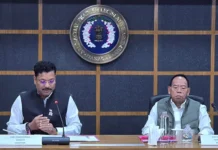ITANAGAR, Nov 5: Chief Minister Pema Khandu asserted that the special provisions dealing with the welfare of the northeastern region and the tribal areas, contained in Article 371 (a) to (j), are “special provisions and not temporary, which will remain as it is.”
In his address at the 8th Rutum Kamgo Memorial Lecture on the topic ‘Abrogation of Article 370 and 35 (A): A step towards national integration’, Khandu said, “These being special provisions are permanent in nature and are aimed at protecting the indigenous culture of the states.”
Hailing the Centre’s decision to abrogate Articles 370 and 35 (A) of the Indian constitution that had given special status to the state of Jammu & Kashmir, Khandu said that “as Modi and Shah have a soft corner for the Northeast, they will not take any decision without first consulting with the states of the region.”
He said that, in the case of Jammu & Kashmir, history had proved that the journey of the separate status provided under the said articles had been towards separatism and not integration.
“Article 370 was inserted in the constitution of India as a temporary provision due to the political circumstances of the time, and has resulted in deprivation of fruits of development to the common people. It created a feeling of separatism, which has been actively fomented and leveraged by our neighbouring countries to disturb the peace and tranquillity in the nation,” he said.
“It’s been 70 years since India attained independence. But for the people of Jammu & Kashmir and Ladakh, real independence came this year, after the abrogation of Article 370,” he said.
Congratulating Prime Minister Narendra Modi and Home Minister Amit Shah on the historic decision, Khandu expressed confidence that “corruption that had resulted in misappropriation of thousands of crores of rupees pumped by the Centre for the state’s development will now end and real development will begin.”
Union MoS for Micro, Small & Medium Enterprises and Animal Husbandry, Dairying and Fisheries, Pratap Chandra Sarangi, lambasted those who opposed the abrogation of Article 370, blaming them for giving it a communal colour.
Delivering the keynote address, Sarangi said, “No one knows why the article was inserted in the constitution in the first place. But as it was a temporary provision, it had to go one day. Crying foul now has no meaning.”
Adding to Khandu’s assertion on Article 371, which encompasses the Northeast, Sarangi said, “Article 370 was a temporary provision and had to go, but Article 371 is a permanent provision; it will stay.”
Marvelling at Arunachal’s unique cultures and natural bounty, Sarangi gave assurance that his ministry would provide support and funds “as much as possible” for implementation of central government schemes feasible in Arunachal.
He informed that he and officials of his ministry had a fruitful review meeting with state government officials, and that they would “jointly work out a proper roadmap for implementation of all government programmes” related to his ministries.
On the occasion, which is organized every year by the Arunachal Pradesh Charitable Task, Tuluk Rida and Nyantom Tikkom were awarded the Neelam Nido Award for preservation and promotion of the indigenous faith and culture.
Earlier in the day, Sarangi met the governor and the chief minister separately to discuss the implementation of various schemes in the state.
The lecture is named after late Rutum Kamgo, a patron of the Lingalaya Mandir in Itanagar and a member of the Donyi Polo and Kargu Gangi Society. A lifetime social worker, Kamgo was known for his dedication towards social service.
Born on 23 March, 1961, in Namuk village in Kamba circle of West Siang district, Kamgo did his initial schooling at the sainik school in Madhya Pradesh. He was associated with various organisations, such as the Lobom Society and the Rashtriya Swayamsevak Sangh. (CMO)

